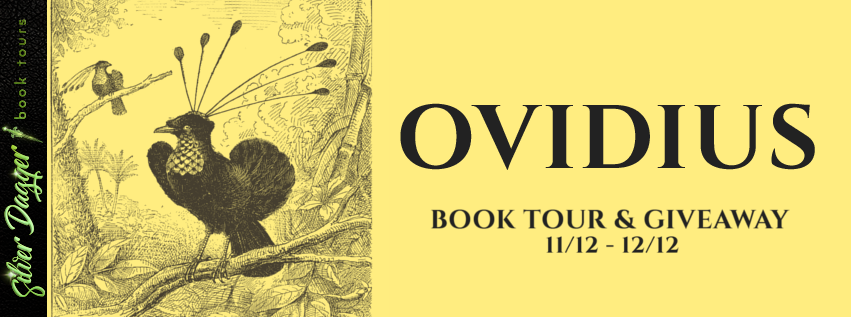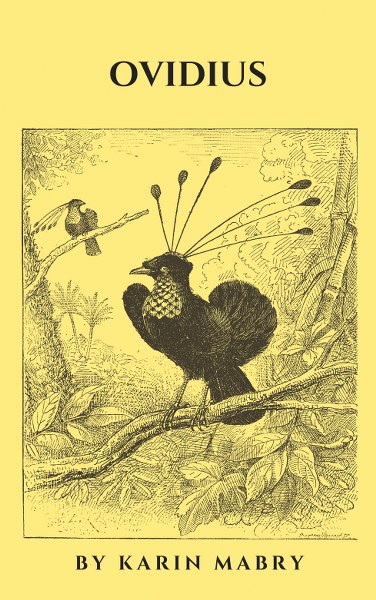Ovidius
by Karin Mabry
Genre: Literary Fiction, Fantasy
'Ovidius' follows the lives of members of the Ovidius community, a neighborhood surrounding The Ovidius Zoo, home of Worthington the Tiger. The animals of Ovidius communicate with each other using mental telepathy, unbeknownst to humans. Some, like Godiva the Cat and Sam the Bird, tweak the agreed-upon system to fit their agendas, Godiva, to write poetry, Sam, to wreak havoc. Others, like Philodendrum the Bullfrog and Xavier the human, friend of Godiva, are just trying to figure out who they really are. Written in the fix-up style, ‘Ovidius’ is a beautiful reflection on animals, spirituality and being wild and free.
If you appreciated the dark social commentary using the
medium of talking animals that George Orwell employed in his classic story,
Animal Farm, you will enjoy reading Ovidius, a dark and sometimes chilling
modern fantasy masterpiece by Karen Mabry.
Ovidius is the story of a group of animals who have
developed the ability to communicate telepathically with each other. When
Worthington the Tiger becomes fed up with being a spectacle for human
entertainment, he makes his escape from the zoo and kills Starlight, one of his
keepers, as well as two zoo officials.
The other animals pass judgment on Worthington, ensuring
that he is sent to a sanctuary, where he kills again. The remainder of the book
tells the story from the perspectives of certain animals who took part in
Worthington’s trial.
Unlike Animal Farm, which is a metaphor for a specific event
(the Russian revolution), Ovidius addresses various sociological issues such as
race and class disparities, consumerism, the modern western penal system, religious
and philosophical idealism, and the harms caused by gender roles and sex
stereotypes. The stories also spotlight such issues as addiction and the failure
of the mental health system. Godiva the cat also expresses the division between
the way most people view the worth of the creative arts and the way creative
individuals view their process.
Worthington the Tiger’s antisocial behavior may have been
caused by being imprisoned by humans for their entertainment, although some animals
feel that Worthington had a bad attitude. Godiva the cat loses interest in reading
and writing poetry when she falls for Clarence, a tough alley cat, and becomes
a mother. This is exactly what Clarence hoped for. Xavier, a young human man,
was incarcerated in a mental health facility and put on psych medications after
wrecking the art room at his high school when he saw his prom date messing
around with one of the art students.
There was nothing that I disliked about Ovidius. On a
personal level, I particularly resonated with the experiences of Godiva and
Xavier.
As a woman, I experienced the expectation that not only
should I care for my child when I became a mother, but I should happily give up
any personal pursuits. When I had to stop working at the long-term care center
where I had been employed for the previous two years because I was having
trouble rebounding following an emergency cesarean section, I wasn’t sorry. I
hated that job. To be asked to give up on my artistic pursuits, however, felt
like losing my soul.
“I didn’t know how much it was hurting my spirit to live as
though my heart was a dirty sock. That is how it felt, to be married to someone
who desired that I love one thing but stop loving something else, that I put
such boundaries and restrictions on my natural inclination towards love.”
--Godiva the Cat
I did find myself giving up on the dream of becoming a
professional musician, but I couldn’t abandon the idea of being involved in the
arts in some capacity. I continued drawing and writing. Although my son is the most
important person in my life and he comes first before even my personal
pursuits, my personal pursuits are essential to my happiness.
As someone whose experiences with the American health care
system as a whole and the mental health system in particular have been less
than stellar, I related to Xavier’s distress.
“Mrs. Knightly had been brought in to help deal with “the
troubled boy.” She is not listening to me, Xavier realized, minutes into their
first meeting.”
At sixteen, my response to the self-important shrink at St.
Anthony’s Hospital was snark. I knew he wasn’t listening and didn’t give a toss,
and I wasn’t going to show him respect. Honestly, I’m proud of my younger self
for that.
“Xavier just told his counselor what he wanted to hear and
went on with his life. The doctors and counselors just wanted to know what they
needed to do to keep Xavier sedate and cooperative.”
Helping people find a sense of purpose is much more
difficult than giving them drugs to make them compliant. I once read a
statement by someone critical of the Western mental health system that the goal
of counselors and psychiatrists is not to help people become happy, it is to
make them become compliant. I fully agree with this sentiment.
If you’re looking for a feel-good animal story, Ovidius is
not that story. If you are looking for biting social commentary where animals
do most of the talking, then Ovidius fills the bill. I am pleased to rate this
thought-provoking book five out of five stars.
“Poets are not whimsical, they are haunted.”
--Godiva the Cat
Hi! Hope you are well and taking good care of yourself and loved ones during these challenging times.
Writing 'Ovidius', my first novel, was a game-changer for me. I wrote a series of novellas then combined them into a fix-up novel, becoming utterly enamored of the medium of the short novel in the process. Telling a story with an economy of words means the use of words is precious. I have found my niche and believe that, literally, everyone should write a short novel. It is delightful, with no fear of being crushed by the daunting task of writing hundreds and hundreds of pages. I have mostly read novels in my life, still yearning to understand what Anais and Jack London have to say about it all. I tried, in 'Ovidius', to create five distinctly different novellas that could stand alone yet come together, seamlessly, as one story.
My poetry books, 'Thrive' and 'A Hamlet of Shelter', were delicious to write, that's all there is to it. I love them and so appreciate my Mother, Maureen, for encouraging me to write what I feel, what I believe. I hope you choose to enjoy what came forth when I gave it a chance. I surely do, each story, each poem, perfectly expressing my belief in presence and imagination. Such a blessing to be human and be able to imagine. All things are possible with God, the God within all of us, Our Father, our collective birthright.
Website * Facebook * Twitter * Amazon * Goodreads
Follow the tour HERE for special content and a giveaway!
$20 Amazon
a Rafflecopter giveaway







Thank you for sharing your wonderful review of this book, I love the cover and the synopsis and excerpt have intrigued me, this is a must read
ReplyDelete